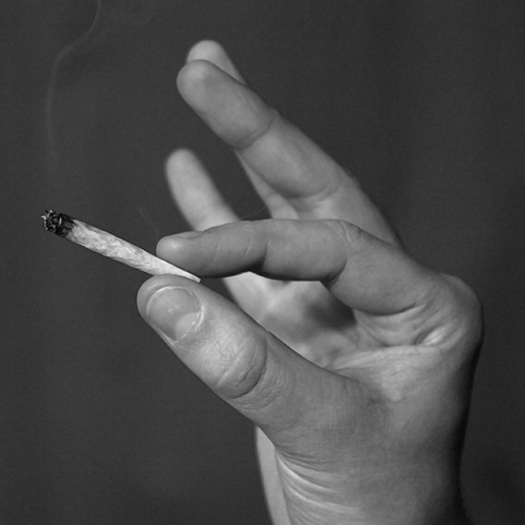 Drugs can cause environmental devastation. Some smokers say it connects them to life, and nature. On the streets of Cairo, a hash shortage is generating some conspiracy theories. Photo via torbenh
Drugs can cause environmental devastation. Some smokers say it connects them to life, and nature. On the streets of Cairo, a hash shortage is generating some conspiracy theories. Photo via torbenh
It may be an attempt to maintain stability while the ailing president was abroad, or a pre-election clampdown on crime. But whatever the conspirators say, more and more Egyptians are asking: “Where has all the hashish gone?”
Hashish, the once ubiquitous yet illegal substance in Egypt, is becoming increasingly difficult to obtain in the country and it’s fueling conspiracy theories and general anxiety. The issue is especially pertinent to the younger generation, the main consumers of the illegal drug derived from marijuana, who resort to the “remedy” as a retreat from their daily troubles.
Egypt amended laws in 1989 making the possession and trade of drugs punishable by life in prison or even death, but this has apparently not reduced the popularity of hashish.
Speaking on condition of anonymity, a young Egyptian told The Media Line that its use is “very tolerated,” adding that his police officer friends had even asked him to store hash for them.
With a waning economy, an unclear political future and frequent reports of politically-motivated clampdowns against opposition activists, hashish has become a popular pastime for young people and a way to take a break from the daily rat race.
“It’s very prevalent,” Sam, author of the Egyptian blog Sand Monkey, told The Media Line. “It’s equal to beer use in the U.S.”
The shortage has caused the street prices to soar. Conspiracy theories abound. The talk of the coffee shops is “Where has it all gone?”
“It’s all half jokes and half conspiracy theories,” said the blogger Sam. “But no one really knows anything.”
A recently formed Facebook group in Arabic entitled “Together against the hashish crisis in Egypt” has so far garnered a modest following of 30 members.
“A large number of Egyptians appreciate hashish and these include decision makers, journalists and artists,” according to the group’s manifesto.
Some Egyptians are reportedly tying the mysterious disappearance of the drug to the recent illness of President Hosni Mubarak and his trip abroad. Government officials, according to this theory, wanted to ensure country remained stable until the president’s return and beefed up security along the borders, which in turn has stemmed the flow of drugs into the country, according to the Egyptian daily Al-Youm A-Sabi.
However, Egyptians are skeptical that the authorities will be able to eradicate hashish altogether, the paper reported. This was because too many people in high places have vested interests in the drug trade and have cohorts in the official positions who will help them preserve their interests.
The matter was even discussed on the popular talk show Cairo Today, in which host Amru Adeeb said the word on the street was that a new official in the anti-drug authority was behind the dramatic decline in hashish.
Many estimate that the current shortage will not last for long.
“Word on the street is that the 2010 hash crisis is almost over,” Sam said. “It will fuel animosity among the population only if the hash does not surface.”
He added, cautiously, that signs of a return were imminent, but did not elaborate.
Sharif Hafez, an Egyptian independent liberal activist said the attempts to eradicate hashish were likely linked to the pending legislative elections coming up at the end of this year, and presidential elections next year.
“The state is fighting corruption because it’s entering an election period,” Hafez told The Media Line. “It’s not just hash. They’re also fighting religious corruption. The government is trying to show they’re doing their job.”
Although he supports the efforts to wipe hashish off the market, Hafez said he believed the government was going about it too radically, instead of instituting a gradual clamp down on it.
“They’re fighting hashish to make a society better off, but at the same time this is creating chaos on the street among young people” he said. “However, it’s good to create this chaos because changes aren’t easy, so I support this.”
“But taking it off all at once is not good. It’s too dramatic, especially when you’re not offering them alternatives in terms of better housing, more money and a better economy,” Hafez said.
According to a survey conducted by the Egypt’s National Council for Combating Drugs, the number of drug addicts in Egypt is around 9%, whereas a report conducted by the National Council for Childhood and Motherhood suggested that some 16% of university students take drugs.
The quantities of drugs seized in Egypt have risen over the last three years, with 25.5 tons of hashish being seized in 2008 – 40% more than the amount seized the previous year. In 2009, the numbers were on a steady rise, and seizures amounted to approximately 27 tons.
(This story is published, with permission from The Media Line.)
Read more on drugs in the Middle East:
Yemen’s Environmental Problems Blamed on Chewing Gat
Afghan Opium Growers Get the Burn Out
Stop Smoking Stupid!



shamefull